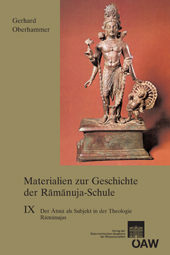

Dieser neunte Teil der „Materialien zur Geschichte der Rāmānuja-Schule" versucht Rāmānujas philosophisch-theologische Lehre vom Ātmā als geistigem Subjekt, die in seinem Werk verstreut und im Zusammenhang verschiedener Probleme zur Sprache kommt, erstmals systematisch zu erschließen. Es zeigt sich, dass Rāmānuja die unvollständig überlieferte philosophische Betrachtung des Ātmā, wie sie Yāmunamuni in seiner Ātmasiddhiḥ dargestellt hat, übernimmt, Ātmā aber durch die Einbindung in seine theologische Sicht des Brahma wesentlich als relationales Prinzip im Menschen versteht, das letztlich in religiös-spiritueller Sicht der „Ort“ möglicher Offenbarung und so menschlicher „Religion“ wird. Bemerkenswert ist, dass der Ātmā ontologisch eine relationale Einheit bildet, in der dank einer „ontologischen Differenz“ zwischen göttlichem und menschlichem Sein der Monismus vermieden wird. In einem zweiten Abschnitt, welcher der Rezeption von Rāmānujas philosophisch-theologischer Reflexion des menschlichen Subjekts gewidmet ist, wird Nārāyaṇāryas Kapitel über den Ātmā aus dessen Nītimālā (ca. 12. Jh.) sowie in Auswahl Meghanādārisūris Darstellung des Ātmā seines Nayadyumaṇiḥ übersetzt und kommentiert. Dabei zeigt sich ein Paradigmenwechsel der Darstellung, der sich dem Rückgriff auf Yāmunamunis Ātmasiddhiḥ verdankt: aus Rāmānujas philosophisch-theologischer Reflexion des Subjektes wurde ein scholastischer „Traktat von der Seele“.
…
The ninth volume of the "Materialien zur Geschichte der Rāmānuja-Schule" tries for the first time to systematically investigate Rāmānuja's philosophical-theological teaching on the Ātmā as a sentient subject, which in his work is dealt with in various places and in the context of various issues. The investigation has revealed that Rāmānuja adopts the reflections on the Ātmā as are taught by Yāmunamuni in his Ātmasiddhiḥ, although these teachings have not been fully worked out. However, in integrating the Ātmā into his theological view of the Brahma, Rāmānuja considers the Ātmā mainly as a relational prinicple in human beings that, in the end, becomes the "place" of possible revelation and thus the "place" of human "religion". It is noteworthy that the Ātmā thus becomes ontologicallyy a relational unit with the divine Ātmā, in which monism is avoided due to an "ontological difference" between the divine and human
beings. The second section of the volume is devoted to the reception of Rāmānuja's philosophical-theological reflections on the human subject. This section offers a translation of and commentary on the chapter about the Ātmā in Nārāyaṇārya's Nītimālā (12th cent.) as well as portions of Meghanādārisūri's portrayal of the Ātmā in his Nayadyumaṇiḥ. A paradigm shift can be seen thereby, due to their falling back on Yāmunamuni's Ātmasiddhiḥ: a scholastic "treatise on the soul" was developed out of Rāmānuja's philosophical-theological reflections on this subject.
2008,
978-3-7001-6500-2
978-3-7001-6569-9
161 Seiten,
22,5x15cm, broschiert